2022年中考英语一轮复习牛津译林版七年级上册Units 3-4 课件(共有PPT51张)
文档属性
| 名称 | 2022年中考英语一轮复习牛津译林版七年级上册Units 3-4 课件(共有PPT51张) | 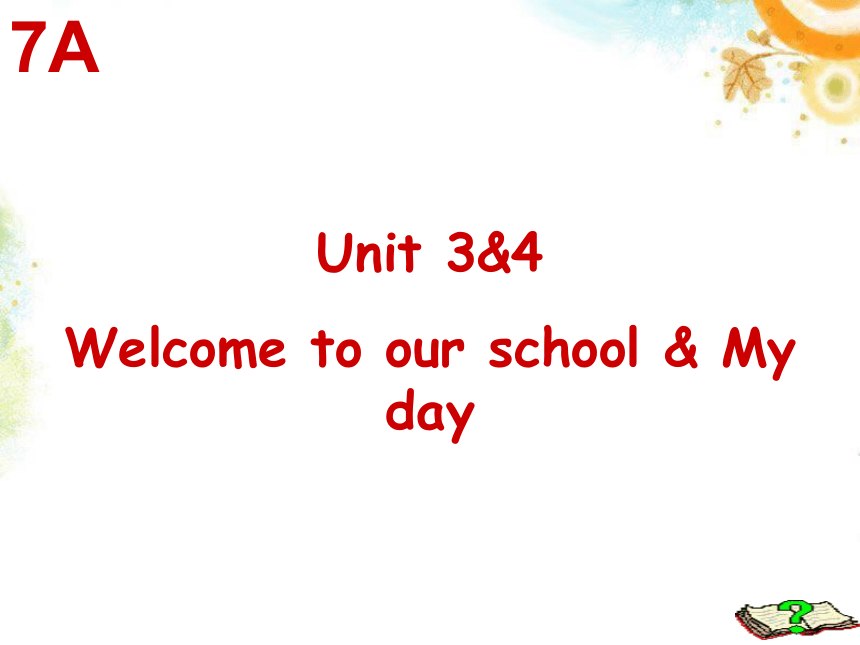 | |
| 格式 | pptx | ||
| 文件大小 | 183.9KB | ||
| 资源类型 | 教案 | ||
| 版本资源 | 牛津译林版 | ||
| 科目 | 英语 | ||
| 更新时间 | 2022-05-05 14:35:56 | ||
图片预览

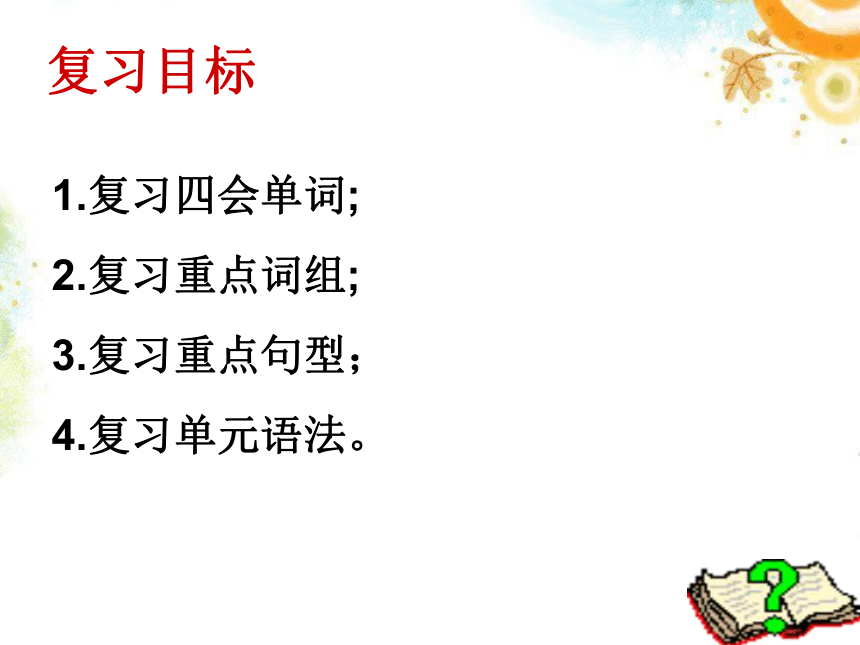
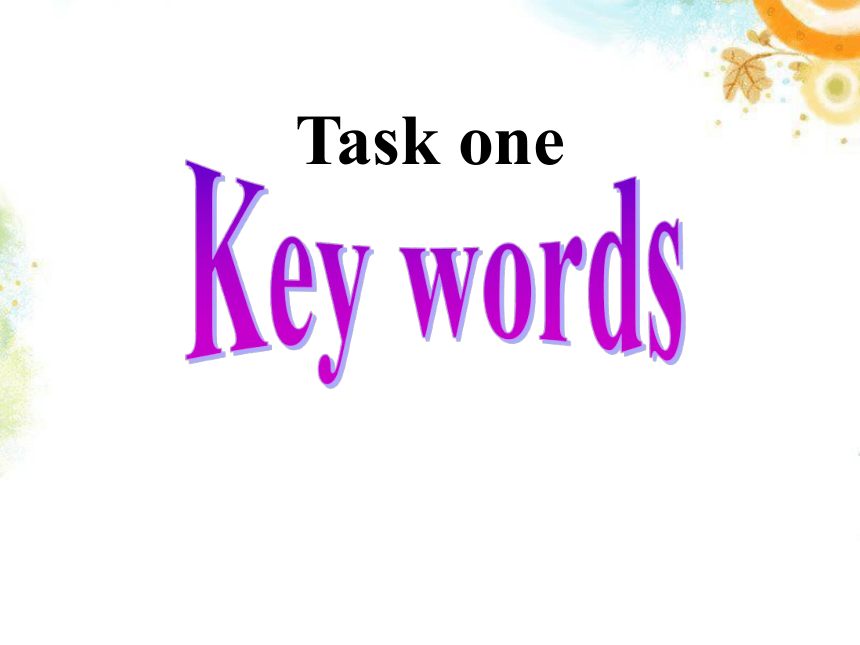
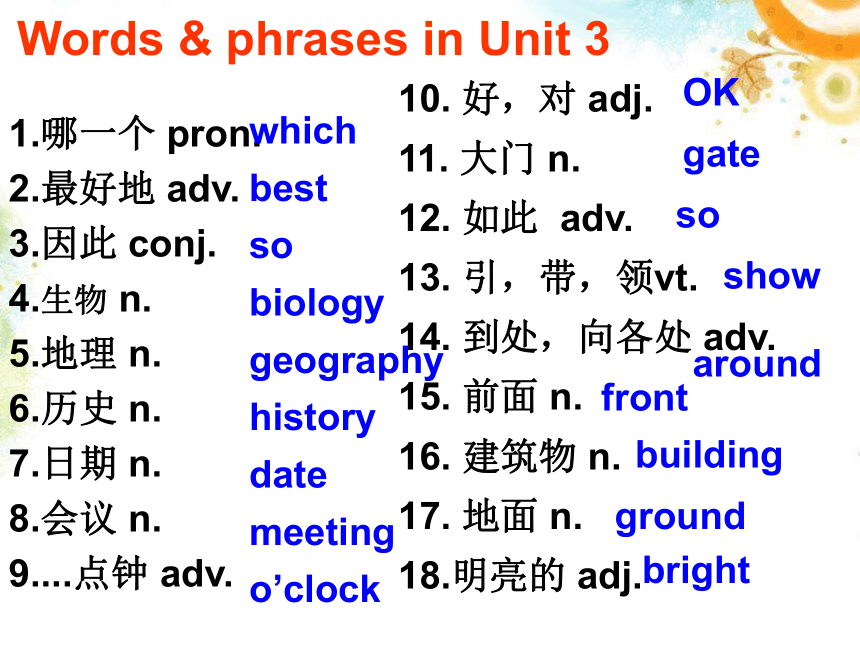
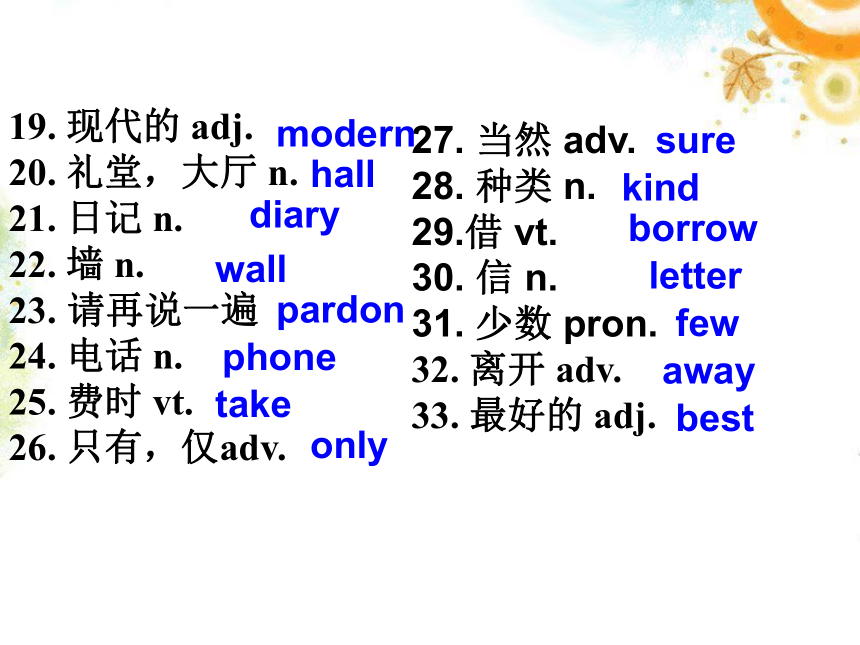
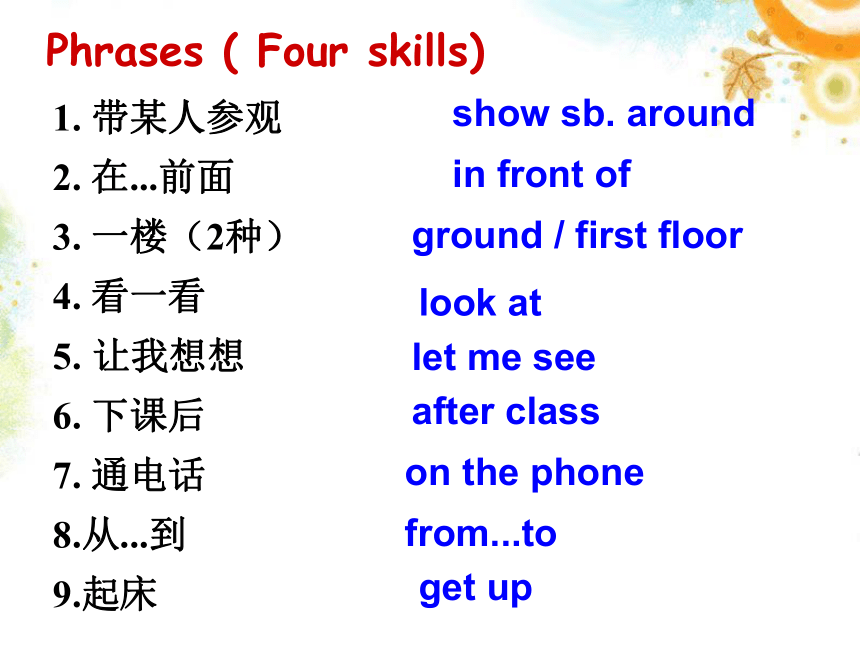
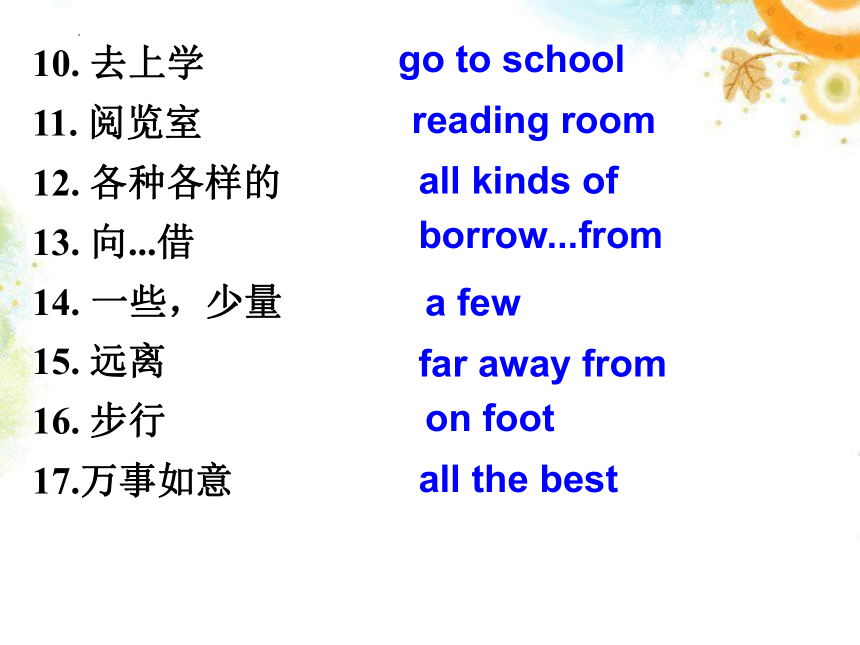
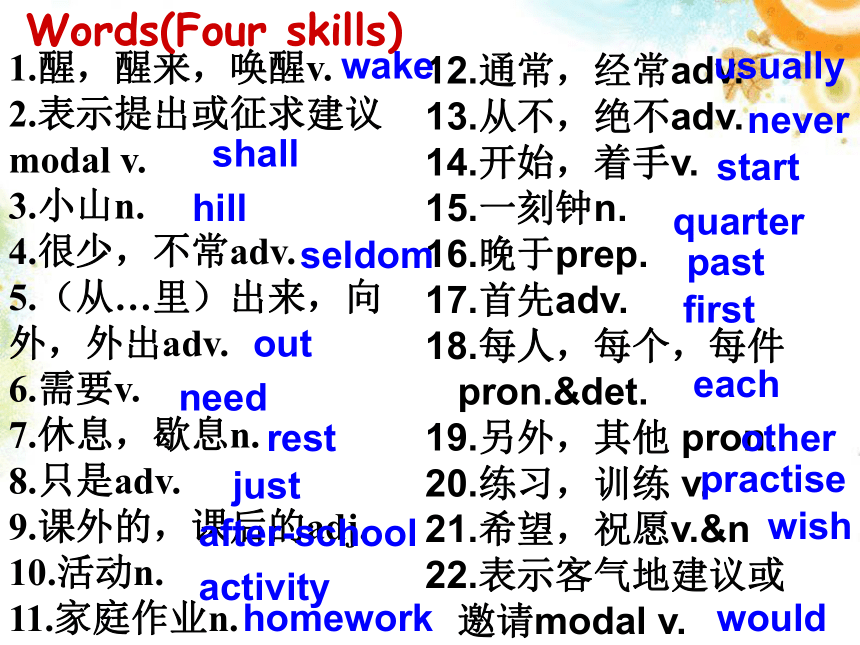
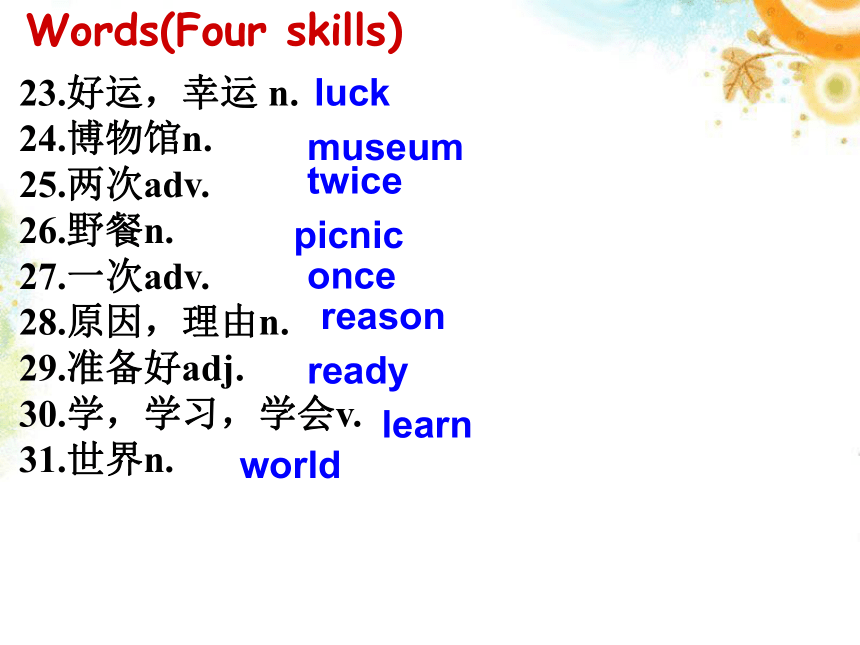
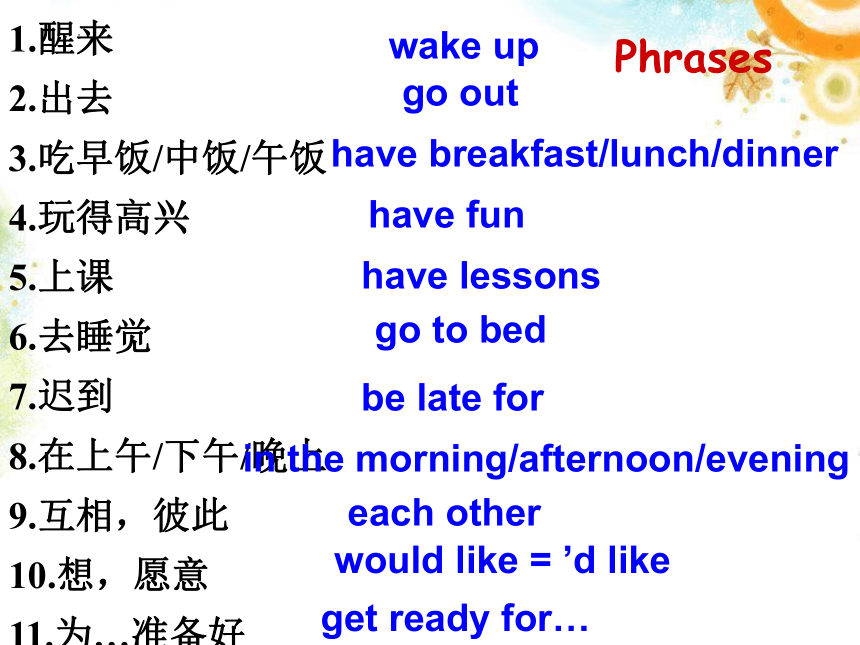
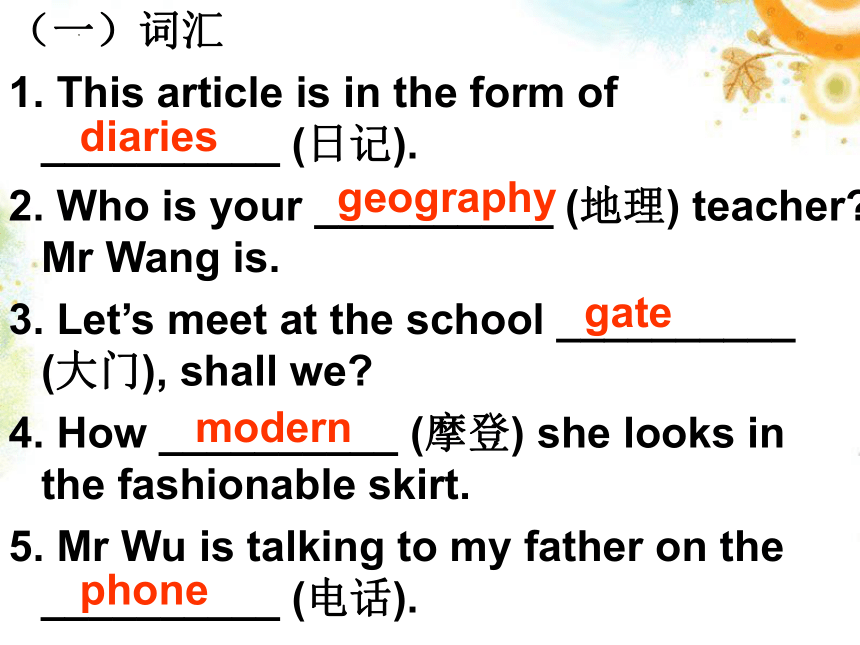
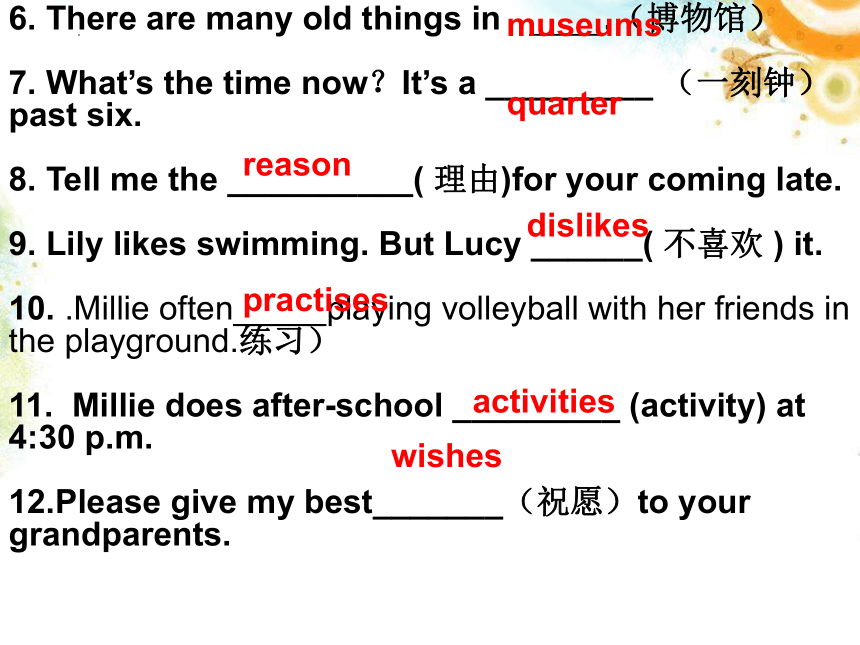
文档简介
(共51张PPT)
Unit 3&4
Welcome to our school & My day
7A
复习目标
1.复习四会单词;
2.复习重点词组;
3.复习重点句型;
4.复习单元语法。
Task one
Key words
Words & phrases in Unit 3
1.哪一个 pron.
2.最好地 adv.
3.因此 conj.
4.生物 n.
5.地理 n.
6.历史 n.
7.日期 n.
8.会议 n.
9....点钟 adv.
10. 好,对 adj.
11. 大门 n.
12. 如此 adv.
13. 引,带,领vt.
14. 到处,向各处 adv.
15. 前面 n.
16. 建筑物 n.
17. 地面 n.
18.明亮的 adj.
which
best
so
biology
geography
history
date
meeting
o’clock
OK
gate
so
show
around
front
building
ground
bright
27. 当然 adv.
28. 种类 n.
29.借 vt.
30. 信 n.
31. 少数 pron.
32. 离开 adv.
33. 最好的 adj.
19. 现代的 adj.
20. 礼堂,大厅 n.
21. 日记 n.
22. 墙 n.
23. 请再说一遍
24. 电话 n.
25. 费时 vt.
26. 只有,仅adv.
modern
hall
diary
wall
pardon
phone
take
only
sure
kind
borrow
letter
few
away
best
1. 带某人参观
2. 在...前面
3. 一楼(2种)
4. 看一看
5. 让我想想
6. 下课后
7. 通电话
8.从...到
9.起床
Phrases ( Four skills)
show sb. around
in front of
ground / first floor
look at
let me see
after class
on the phone
from...to
get up
10. 去上学
11. 阅览室
12. 各种各样的
13. 向...借
14. 一些,少量
15. 远离
16. 步行
17.万事如意
go to school
reading room
all kinds of
borrow...from
a few
far away from
on foot
all the best
12.通常,经常adv.
13.从不,绝不adv.
14.开始,着手v.
15.一刻钟n.
16.晚于prep.
17.首先adv.
18.每人,每个,每件pron.&det.
19.另外,其他 pron.
20.练习,训练 v.
21.希望,祝愿v.&n
22.表示客气地建议或邀请modal v.
1.醒,醒来,唤醒v.
2.表示提出或征求建议modal v.
3.小山n.
4.很少,不常adv.
5.(从…里)出来,向外,外出adv.
6.需要v.
7.休息,歇息n.
8.只是adv.
9.课外的,课后的adj.
10.活动n.
11.家庭作业n.
Words(Four skills)
wake
shall
hill
seldom
out
need
rest
just
after-school
activity
homework
never
start
quarter
past
first
each
other
practise
wish
would
usually
23.好运,幸运 n.
24.博物馆n.
25.两次adv.
26.野餐n.
27.一次adv.
28.原因,理由n.
29.准备好adj.
30.学,学习,学会v.
31.世界n.
Words(Four skills)
luck
museum
twice
picnic
once
reason
ready
world
learn
1.醒来
2.出去
3.吃早饭/中饭/午饭
4.玩得高兴
5.上课
6.去睡觉
7.迟到
8.在上午/下午/晚上
9.互相,彼此
10.想,愿意
11.为…准备好
Phrases
wake up
go out
have breakfast/lunch/dinner
have fun
have lessons
go to bed
be late for
in the morning/afternoon/evening
each other
would like = ’d like
get ready for…
(一)词汇
1. This article is in the form of __________ (日记).
2. Who is your __________ (地理) teacher Mr Wang is.
3. Let’s meet at the school __________ (大门), shall we
4. How __________ (摩登) she looks in the fashionable skirt.
5. Mr Wu is talking to my father on the __________ (电话).
diaries
geography
gate
modern
phone
6. There are many old things in .(博物馆)
7. What’s the time now?It’s a _________ (一刻钟)past six.
8. Tell me the __________( 理由)for your coming late.
9. Lily likes swimming. But Lucy ______( 不喜欢 ) it.
10. .Millie often_____playing volleyball with her friends in the playground.练习)
11. Millie does after-school _________ (activity) at 4:30 p.m.
12.Please give my best_______(祝愿)to your grandparents.
museums
quarter
reason
dislikes
practises
activities
wishes
1. There’s a __________ (parent) meeting in our school today.
2. Do you like living on the ground floor or the __________ (one) floor
3. Tom is one of the __________ (good) students in his class.
4. There are eleven __________ (build) in our school.
5. Jim is really good at __________ (learn) new things.
parents’
best
first
buildings
learning
用所给词的适当形式填空
6. Look! The shop is _________ (close). Let's come here tomorrow.
7. Thanks for _________ (tell) me the good news.
8. Millie is my best friend. I usually chat with _________ (she) after school.
9. They fly to Moscow on business _________ (two) a year.
closed
telling
her
twice
show
1.Can you ______me your photographs
2. She _________great interest in American drama.
3. He ________ me _______ the factory yesterday(带...参观).
4. We visited an art ______this morning.
5. Sunshine Cinema is _________a movie called Roman Holiday .
6. Her worry __________ in her eyes.
7. He never ___________( 炫耀 ).
单词辨析
showed
showing
showed
show
shows
show
shows off
around
1. borrow / lend / keep
(1)My bike is broken. Can I _____ yours Yes, but you can’t _____ it to others.
(2)They often ______ books from the library when they were at school.
(3)I ______ some money to Tom, but he forgot to return it to me in time.
(4)How long can I ______ these magazines About two week.
borrow
lend
borrowed
lent
keep
3. 1. wake-woke-woken(v.) awake(adj.)
wake sb. up和wake up sb叫醒某人,若wake up后的宾语是代词则用wake sb. up My mum____________ (叫醒我)at seven every morning
wake up 醒来 What time did you ___________ this morning
I _______________ since the fireworks were let off on New Year’s Day.
have been awake
wakes meup
wake up
2. few / a few / little / a little
(1)After ______ comfortable months, the robot started to go wrong.
(2)India is one of the ______ places where tigers still live in the wild.
(3)After the winter holiday, he got ______ fatter.
(4)There is ______ milk in the bottle, is there
(5)It is such ______ sheep that it can’t walk fast.
(6) Ther is only ________ milk. Let’s buy some.
a few
few
a little
little
a little
a little
6. luck n. 运气1. wish you good luck ; good luck to sb with sth
lucky (adj) a lucky dog/ an unlucky accident luckier/ luckiest
Unluckily (adv), he didn’t get hurt badly
(1)He is ______ enough to pass the exam.
(2)___________, the police didn’t come right away and the thief ran away.
[搭配] good luck “好运 ” bad luck “倒霉”
lucky
Unluckily
6. wish 与 hope
wish通常指不能实现或很难实现的愿望(n.) 希望,祝愿 make wishes
(v.) 希望,祝愿 wish sb that+从句(宾语从句多用过去时态,表示虚拟语气)
wish (sb) to do sth , wish sb +n.
I wish you a very happy life. 。
I wish I were 30 years younger. 但愿我能年轻三十岁。
hope通常指可以实现的愿望(n.) 希望 lose hope
(v.)希望 hope to do sth, hope that +从句
I hope to go to college. 我希望上大学。
I hope you‘ll be better soon. 我希望你能很快好起来
5. which / what
(1) ______ subject do you like better, Chinese or Maths
(2) ______ is your favourite subject
(3) ______ is the way to the park
6. model / modern / medal / metal
(1)The ______ of this ______ is made of ______.
(2)This ______ ______ looks ______.
Which
What
Which
model
medal
metal
metal
medal
modern
2. fun, funny, interesting
fun (ucn.) have (great) fun doing sth, do sth for fun, It’s great fun to do sth.
funny (adj.) 有趣的,滑稽的,搞笑的 a funny story/funnier
interesting (adj.) 有趣的 an interesting book
funny (adj.) 有趣的,滑稽的,搞笑的 a funny story
interesting (adj.) 有趣的 an interesting book
(1)What great __________ we had chatting with each other last night!
(2)He often tells us ________ jokes to make us happy.
fun
funny/interesting
10. need (v./n./情态动词) 需要
V. need sth/ to do sth/… to do sth need… doing/to be done;n. in need (of sth); satisfy different needs;情态动词(疑问句/否定句) needn’t do sth= not need/have to do sth
We still ____________________________(还要两天来完成这个任务).
Your room __________________________________ (需要打扫).
It’s hard to _____________________(满足他的需求).
Must I hand in my homework now No, you ____________________(没必要).
need 2 days to finish the task
need cleaning/to be cleaned
satisfy his needs
needn’t / don’t need to/have to
Task 2
Key phrases
1、欢迎来到我们学校
2、擅长于
3、开放日
4、家长会
5、在校门口
6、在前面/ 在……前部分
7、那位穿白衬衫的男人
8、向某人问好
9、步行上学
Translate into English
Welcome to our school
be good at / do well in
Open Day
parents’ meeting
at the school gate
in front of / in the front of
that man in a white shirt
say hello to sb
go to school on foot / walk to school
Translate into English
1.把我叫醒
2.做早操
3.有太多的作业
4. 做课外活动
5. 对某人好
6. 互相聊天
7.在八点一刻
8. 训练打排球
9. 在周三下午
10. 在三月植树
wake me up
do morning exercises
have too much homework
do after-school activities
be nice to sb
chat with each other
at a quarter past eight
practise playing volleyball
on Wednesday afternoon
plant trees in March
Translate into English
11. 有许多时间做某事
12. 在6岁时
13. 一个月两次
14. 祝我们的球队好运
15. 去野炊
16. 对某人有益
17. 多了解世界
18. 为一天做好准备
19. 如何玩得高兴
20. 跳舞两小时
have much time to do sth
at the age of six
twice a month
wish our team good luck
go on picnics
be good for sb
learn a lot about the world
get ready for the day
how to have fun
dance for two hours
Task 3
Important sentences
1. What's the date today, Millie 米莉,今天几号?
该句型常用来询问日期,相当于“What date is it today?”
(1)询问时间 —What time is it now/What's the time now
—It's nine o'clock. It's time for English class.
(2)询问星期—What day is it today?—It's Monday.
2. My classroom is on the ground floor. 我的教室在一楼。
表达“第一层楼”,英国人通常说the ground floor,美国人则说the first floor;表达“第二层楼”,英国人通常说the first floor,美国人则说the second floor。
3. 太多too much +不可数too many +可数; 太…much too… + 形容词/副词
I am___________tired(累),but I have_______ homework to do.
( )2. We students should not watch____TV or_____ films on weekdays.
A. too much; too much B. too many; too many
C. too much; too many D. too many; too much
much too
too much
c
4. Is it time for breakfast 吃早餐的时间到了吗?
It's time for sth. 到该(做)某事的时间了;
It's time to do sth. 是该干某事的时间了;
It's time for sb. to do sth. 是该某人干某事的时间了。
(1)是该做家庭作业的时候了。
It's ______ ______ do my homework.
= It's ______ ______ my homework.
(2)是该我们听音乐的时候了。
It's time _________ _________ _________ _________ _________ music.
time to
time for
for us to
listen to
5. They help us get ready for the day. 它们帮助我们为一天做好准备。
(1) v. help (sb). (to) do sth, help (sb) with sth ;
n. a great help; need help with Math;
can’t help doing sth情不自禁做某事; a helping hand
(1)Can you help me ___________ (carry) the box
(2)( ) I often help my mother ________ the housework at weekends.
do B. to do C. with D. All of the above
(2)get ready for sth 意为“为……做好准备”。
Most of the students are busy getting ready for the coming sports meeting.大部分学生正忙于为即将到来的运动会做好准备。
.
carry
D
6. in front of 和 in the front of
(1)in front of 意为“在……前面”, 指在某物外部的前面。
(2)in the front of意为“在……的前部”,指在某物内部的前面。
There is a big tree __________ our school gate.
Our teacher is standing _________________ the classroom.
in front of
in the front of
7. It takes me about an hour to get to school.
Eg. The book cost 2 pounds.= ________________________________________.
试一试:(1)This book ________ me ten yuan.
(2)Don’t ________ so much time watching TV.
(3)People over 12 must ________ 20¥ for the ticket.
(4)It ________ him about ten years to finish writing this novel.
The book was worth 2 pounds.
costs
spend
pay
took
8. How do you get to school
(1) I get to school by bus / car / bike / on foot
get to school ____ bus / = go to school _____a/the bus=__________ to school.
(2) 注意区别:get / arrive / reach
get to=arrive in/at=reach+地点名词 get/arrive/reach+地点副词
试一试:(1)When will the plane ________
(2)They ________ in Beijing at 7 p.m. last night.
(3)Please call me when you ________ there.
(4)He is too short to ________ the apples on the tree.
by
arrive
arrived
arrive/reach/get
reach/get to
on
take a bus to
9. 穿黑色套装那个男人是谁?
Who is the man ________________________________.
注意区别:be in / wear / put on / dress
试一试:(1)She is too young to ________ herself.
(2)Look! He is ________ the school uniform.
(3)Mr Green ________ his coat and went out.
(4)The woman ________ red looks modern and young.
in / wearing a black suit
dress
wearing
put on
in
10. We often chat with each other or play games. 我们经常相互聊天或做游戏。
chat(v.) 聊天,闲聊,chat with sb.与某人聊天;
chat(n.),have a chat with sb.也表示与某人聊天。 chat-chatted-chatting
( ) I would like to have a chat ________ you.
A. with B. for C. on D. of
A
11. We do morning exercises every day. 我们每天做早操。
Exercise (n./v.),意思是“锻炼,练习”,do some exercise进行体育锻炼;
do morning/eye exercises做早操;
(1)Please finish _________________________ (所有的练习)on P23.
(2)We should________________________(进行体育锻炼) to keep healthy.
all the exercises
do exercise
12. We practise after school on Wednesday afternoon.
(1)vt,后面可接名词、代词或动名词作宾语,不能接不定式。
She spent as much time as she could _______________________ . (练习讲英语)
(2)practise还可用作不及物动词。________ more and you'll make progress.
[注意] practise的名词形式为practice,为不可数名词。
Practice makes perfect.熟能生巧。
practise speaking English
Practise
13. They're good for us. 它们对我们有好处。
区分 be good for/at/to
(1)Are all your friends good __________ you
(2) Mike is good ________ playing football.
(3) I know that sweet snacks are not good ________ me.
to
at
for
14.我上学从不迟到。
I never ___________________________./
I am never___________________________
go to school late
late for school
Task 4
Grammar land
人称代词(主格) I you he she it we you they
人称代词(宾格) me you him her it us you them
形容词性物主代词 my your his her its our your their
名词性物主代词 mine yours his hers its ours yours theirs
反身代词 myself yourself himself herself itself ourselves yourselves themselves
一 (1) 人称代词----主格/宾格
注意:1.人称代词分主格和宾格,在句中做主语用主格,做宾语用宾格
2.在使用并列单数人称时顺序是“二三一”,复数人称并列时还是“一二三”。
(2)物主代词 ----形容词性物主代词/名词性物主代词
注意;形容词性物主代词只能作主语;名词性物主代词可单独作主语,宾语或表语,它相当于形容词性物主代词+名词。
(3)反身代词
注意:1.作动词或介词的宾语。
Don’t worry about me. I’m old enough to think for ______.
A. himself B. herself C. yourself D. myself
D
2.作主语或宾语的同位语。 I ________ do not agree. 我本人不同意。
3.反身代词与某些动词连用时表示某种特定的意义。
Help yourself to some meat,please. help/enjoy/teach/hurt oneself
myself
Exercise:
1. ----Who taught _________ French ---- Nobody. I learnt it by _________.
2. There is someone knocking at door. Let’s go to see who _________ is.
3. I hope they can enjoy _________ at the party.
4. Mr Green is an English teacher. ________ teaches ________ (我们) English.
_______ all like _______ lessons, _______ are very interesting and lively.
He
us
We
his
they
you
myself
it
themselves
(一)表示时间的介词:on, at, in
on用于特指某一天
on Monday, on May 2nd, on the evening of June 1, on a cold morning
at用于时间点,年龄,三餐,节日等
at 7 p.m. at breakfast, at Christmas, at night, at 16 years old
in 用于年,月,季节,世纪以及一天的部分时间 in the evening, in 2006, in May, in winter, in the 19th century, in the daytime
[试一试]
用on, at, in 填空
1. We don’t go to school __________ Sunday.
2. My birthday is _______ April 1st.
3. We’re going to see the doctor ______ four o’clock.
4. He often takes Eddie for a walk ________ the evening.
5. They have a long holiday _____ November.
6. He was born ________ 1992.
7. He likes reading newspapers _________ breakfast.
8. She starts learning English __________ 6 o’clock.
on
on
at
in
in
in
at
at
[试一试]
9. It’s cold __________ winter in China.
10. They play the game __________ the evening of 31st October.
11. He got home __________ the morning of the 4th last month.
12. My father usually goes fishing __________ the weekend.
13. It is a good idea to go for a walk __________ a sunny morning.
14. The story happened __________ a cold winter morning.
at
in
on
on
on
on
in
on
on
in
on
at
on
in
on
on
at
on
in
on
on
on
at
on
in
on
(2)频度副词 (频率由高到低):
always(总是)usually(通常)often (经常) sometimes(有时)seldom(很少)never(从不)
频率副词在句中的位置:
1. 频率副词用在be动词、助动词、情态动词后。
It is usually hot in summer. 夏天天气通常是热的。
2. 频率副词用在主要动词前。
My father usually walks home. 我的父亲经常步行回家。
3. 对频率副词提问要用how often
单项选择
( )1. We must protect plants. They are friends of ______
A. we B. us C. our D. ours
( )2. ---Tom, go and join your sister is cleaning the yard.
---Why _______ John is sitting there doing nothing at all.
A. I B. me C. myself D. mine
( )3. Playing games ____ Andy 1 hour and _____25 dollar last night, while Lily _____ the same time reading a book for which she ____ 25 dollars.
spent ,took, cost paid B. took, cost, spent, paid
C.cost, paid, spent, took D.paid, spent, took, cost
D
B
B
( )4. Health experts(专家) believe that even _______ exercise is better than none at all.
A. few B. a few C. little D. a little
( )5. Could I use your bike _______ is broken.
Certainly But please ______ it back soon. I need it this evening.
mine; give B. mine; lend
C. my; borrow D. my; keep
( )6. How long did the trip from Beijing to Nanjing _______ you
About three hours.
A. cost B. take C. spend D. pay
( )7. Where did you get the book From the library and I have _______ it for two weeks.
A. borrowed B. lent C. kept D. bought
D
A
B
C
Unit 3&4
Welcome to our school & My day
7A
复习目标
1.复习四会单词;
2.复习重点词组;
3.复习重点句型;
4.复习单元语法。
Task one
Key words
Words & phrases in Unit 3
1.哪一个 pron.
2.最好地 adv.
3.因此 conj.
4.生物 n.
5.地理 n.
6.历史 n.
7.日期 n.
8.会议 n.
9....点钟 adv.
10. 好,对 adj.
11. 大门 n.
12. 如此 adv.
13. 引,带,领vt.
14. 到处,向各处 adv.
15. 前面 n.
16. 建筑物 n.
17. 地面 n.
18.明亮的 adj.
which
best
so
biology
geography
history
date
meeting
o’clock
OK
gate
so
show
around
front
building
ground
bright
27. 当然 adv.
28. 种类 n.
29.借 vt.
30. 信 n.
31. 少数 pron.
32. 离开 adv.
33. 最好的 adj.
19. 现代的 adj.
20. 礼堂,大厅 n.
21. 日记 n.
22. 墙 n.
23. 请再说一遍
24. 电话 n.
25. 费时 vt.
26. 只有,仅adv.
modern
hall
diary
wall
pardon
phone
take
only
sure
kind
borrow
letter
few
away
best
1. 带某人参观
2. 在...前面
3. 一楼(2种)
4. 看一看
5. 让我想想
6. 下课后
7. 通电话
8.从...到
9.起床
Phrases ( Four skills)
show sb. around
in front of
ground / first floor
look at
let me see
after class
on the phone
from...to
get up
10. 去上学
11. 阅览室
12. 各种各样的
13. 向...借
14. 一些,少量
15. 远离
16. 步行
17.万事如意
go to school
reading room
all kinds of
borrow...from
a few
far away from
on foot
all the best
12.通常,经常adv.
13.从不,绝不adv.
14.开始,着手v.
15.一刻钟n.
16.晚于prep.
17.首先adv.
18.每人,每个,每件pron.&det.
19.另外,其他 pron.
20.练习,训练 v.
21.希望,祝愿v.&n
22.表示客气地建议或邀请modal v.
1.醒,醒来,唤醒v.
2.表示提出或征求建议modal v.
3.小山n.
4.很少,不常adv.
5.(从…里)出来,向外,外出adv.
6.需要v.
7.休息,歇息n.
8.只是adv.
9.课外的,课后的adj.
10.活动n.
11.家庭作业n.
Words(Four skills)
wake
shall
hill
seldom
out
need
rest
just
after-school
activity
homework
never
start
quarter
past
first
each
other
practise
wish
would
usually
23.好运,幸运 n.
24.博物馆n.
25.两次adv.
26.野餐n.
27.一次adv.
28.原因,理由n.
29.准备好adj.
30.学,学习,学会v.
31.世界n.
Words(Four skills)
luck
museum
twice
picnic
once
reason
ready
world
learn
1.醒来
2.出去
3.吃早饭/中饭/午饭
4.玩得高兴
5.上课
6.去睡觉
7.迟到
8.在上午/下午/晚上
9.互相,彼此
10.想,愿意
11.为…准备好
Phrases
wake up
go out
have breakfast/lunch/dinner
have fun
have lessons
go to bed
be late for
in the morning/afternoon/evening
each other
would like = ’d like
get ready for…
(一)词汇
1. This article is in the form of __________ (日记).
2. Who is your __________ (地理) teacher Mr Wang is.
3. Let’s meet at the school __________ (大门), shall we
4. How __________ (摩登) she looks in the fashionable skirt.
5. Mr Wu is talking to my father on the __________ (电话).
diaries
geography
gate
modern
phone
6. There are many old things in .(博物馆)
7. What’s the time now?It’s a _________ (一刻钟)past six.
8. Tell me the __________( 理由)for your coming late.
9. Lily likes swimming. But Lucy ______( 不喜欢 ) it.
10. .Millie often_____playing volleyball with her friends in the playground.练习)
11. Millie does after-school _________ (activity) at 4:30 p.m.
12.Please give my best_______(祝愿)to your grandparents.
museums
quarter
reason
dislikes
practises
activities
wishes
1. There’s a __________ (parent) meeting in our school today.
2. Do you like living on the ground floor or the __________ (one) floor
3. Tom is one of the __________ (good) students in his class.
4. There are eleven __________ (build) in our school.
5. Jim is really good at __________ (learn) new things.
parents’
best
first
buildings
learning
用所给词的适当形式填空
6. Look! The shop is _________ (close). Let's come here tomorrow.
7. Thanks for _________ (tell) me the good news.
8. Millie is my best friend. I usually chat with _________ (she) after school.
9. They fly to Moscow on business _________ (two) a year.
closed
telling
her
twice
show
1.Can you ______me your photographs
2. She _________great interest in American drama.
3. He ________ me _______ the factory yesterday(带...参观).
4. We visited an art ______this morning.
5. Sunshine Cinema is _________a movie called Roman Holiday .
6. Her worry __________ in her eyes.
7. He never ___________( 炫耀 ).
单词辨析
showed
showing
showed
show
shows
show
shows off
around
1. borrow / lend / keep
(1)My bike is broken. Can I _____ yours Yes, but you can’t _____ it to others.
(2)They often ______ books from the library when they were at school.
(3)I ______ some money to Tom, but he forgot to return it to me in time.
(4)How long can I ______ these magazines About two week.
borrow
lend
borrowed
lent
keep
3. 1. wake-woke-woken(v.) awake(adj.)
wake sb. up和wake up sb叫醒某人,若wake up后的宾语是代词则用wake sb. up My mum____________ (叫醒我)at seven every morning
wake up 醒来 What time did you ___________ this morning
I _______________ since the fireworks were let off on New Year’s Day.
have been awake
wakes meup
wake up
2. few / a few / little / a little
(1)After ______ comfortable months, the robot started to go wrong.
(2)India is one of the ______ places where tigers still live in the wild.
(3)After the winter holiday, he got ______ fatter.
(4)There is ______ milk in the bottle, is there
(5)It is such ______ sheep that it can’t walk fast.
(6) Ther is only ________ milk. Let’s buy some.
a few
few
a little
little
a little
a little
6. luck n. 运气1. wish you good luck ; good luck to sb with sth
lucky (adj) a lucky dog/ an unlucky accident luckier/ luckiest
Unluckily (adv), he didn’t get hurt badly
(1)He is ______ enough to pass the exam.
(2)___________, the police didn’t come right away and the thief ran away.
[搭配] good luck “好运 ” bad luck “倒霉”
lucky
Unluckily
6. wish 与 hope
wish通常指不能实现或很难实现的愿望(n.) 希望,祝愿 make wishes
(v.) 希望,祝愿 wish sb that+从句(宾语从句多用过去时态,表示虚拟语气)
wish (sb) to do sth , wish sb +n.
I wish you a very happy life. 。
I wish I were 30 years younger. 但愿我能年轻三十岁。
hope通常指可以实现的愿望(n.) 希望 lose hope
(v.)希望 hope to do sth, hope that +从句
I hope to go to college. 我希望上大学。
I hope you‘ll be better soon. 我希望你能很快好起来
5. which / what
(1) ______ subject do you like better, Chinese or Maths
(2) ______ is your favourite subject
(3) ______ is the way to the park
6. model / modern / medal / metal
(1)The ______ of this ______ is made of ______.
(2)This ______ ______ looks ______.
Which
What
Which
model
medal
metal
metal
medal
modern
2. fun, funny, interesting
fun (ucn.) have (great) fun doing sth, do sth for fun, It’s great fun to do sth.
funny (adj.) 有趣的,滑稽的,搞笑的 a funny story/funnier
interesting (adj.) 有趣的 an interesting book
funny (adj.) 有趣的,滑稽的,搞笑的 a funny story
interesting (adj.) 有趣的 an interesting book
(1)What great __________ we had chatting with each other last night!
(2)He often tells us ________ jokes to make us happy.
fun
funny/interesting
10. need (v./n./情态动词) 需要
V. need sth/ to do sth/… to do sth need… doing/to be done;n. in need (of sth); satisfy different needs;情态动词(疑问句/否定句) needn’t do sth= not need/have to do sth
We still ____________________________(还要两天来完成这个任务).
Your room __________________________________ (需要打扫).
It’s hard to _____________________(满足他的需求).
Must I hand in my homework now No, you ____________________(没必要).
need 2 days to finish the task
need cleaning/to be cleaned
satisfy his needs
needn’t / don’t need to/have to
Task 2
Key phrases
1、欢迎来到我们学校
2、擅长于
3、开放日
4、家长会
5、在校门口
6、在前面/ 在……前部分
7、那位穿白衬衫的男人
8、向某人问好
9、步行上学
Translate into English
Welcome to our school
be good at / do well in
Open Day
parents’ meeting
at the school gate
in front of / in the front of
that man in a white shirt
say hello to sb
go to school on foot / walk to school
Translate into English
1.把我叫醒
2.做早操
3.有太多的作业
4. 做课外活动
5. 对某人好
6. 互相聊天
7.在八点一刻
8. 训练打排球
9. 在周三下午
10. 在三月植树
wake me up
do morning exercises
have too much homework
do after-school activities
be nice to sb
chat with each other
at a quarter past eight
practise playing volleyball
on Wednesday afternoon
plant trees in March
Translate into English
11. 有许多时间做某事
12. 在6岁时
13. 一个月两次
14. 祝我们的球队好运
15. 去野炊
16. 对某人有益
17. 多了解世界
18. 为一天做好准备
19. 如何玩得高兴
20. 跳舞两小时
have much time to do sth
at the age of six
twice a month
wish our team good luck
go on picnics
be good for sb
learn a lot about the world
get ready for the day
how to have fun
dance for two hours
Task 3
Important sentences
1. What's the date today, Millie 米莉,今天几号?
该句型常用来询问日期,相当于“What date is it today?”
(1)询问时间 —What time is it now/What's the time now
—It's nine o'clock. It's time for English class.
(2)询问星期—What day is it today?—It's Monday.
2. My classroom is on the ground floor. 我的教室在一楼。
表达“第一层楼”,英国人通常说the ground floor,美国人则说the first floor;表达“第二层楼”,英国人通常说the first floor,美国人则说the second floor。
3. 太多too much +不可数too many +可数; 太…much too… + 形容词/副词
I am___________tired(累),but I have_______ homework to do.
( )2. We students should not watch____TV or_____ films on weekdays.
A. too much; too much B. too many; too many
C. too much; too many D. too many; too much
much too
too much
c
4. Is it time for breakfast 吃早餐的时间到了吗?
It's time for sth. 到该(做)某事的时间了;
It's time to do sth. 是该干某事的时间了;
It's time for sb. to do sth. 是该某人干某事的时间了。
(1)是该做家庭作业的时候了。
It's ______ ______ do my homework.
= It's ______ ______ my homework.
(2)是该我们听音乐的时候了。
It's time _________ _________ _________ _________ _________ music.
time to
time for
for us to
listen to
5. They help us get ready for the day. 它们帮助我们为一天做好准备。
(1) v. help (sb). (to) do sth, help (sb) with sth ;
n. a great help; need help with Math;
can’t help doing sth情不自禁做某事; a helping hand
(1)Can you help me ___________ (carry) the box
(2)( ) I often help my mother ________ the housework at weekends.
do B. to do C. with D. All of the above
(2)get ready for sth 意为“为……做好准备”。
Most of the students are busy getting ready for the coming sports meeting.大部分学生正忙于为即将到来的运动会做好准备。
.
carry
D
6. in front of 和 in the front of
(1)in front of 意为“在……前面”, 指在某物外部的前面。
(2)in the front of意为“在……的前部”,指在某物内部的前面。
There is a big tree __________ our school gate.
Our teacher is standing _________________ the classroom.
in front of
in the front of
7. It takes me about an hour to get to school.
Eg. The book cost 2 pounds.= ________________________________________.
试一试:(1)This book ________ me ten yuan.
(2)Don’t ________ so much time watching TV.
(3)People over 12 must ________ 20¥ for the ticket.
(4)It ________ him about ten years to finish writing this novel.
The book was worth 2 pounds.
costs
spend
pay
took
8. How do you get to school
(1) I get to school by bus / car / bike / on foot
get to school ____ bus / = go to school _____a/the bus=__________ to school.
(2) 注意区别:get / arrive / reach
get to=arrive in/at=reach+地点名词 get/arrive/reach+地点副词
试一试:(1)When will the plane ________
(2)They ________ in Beijing at 7 p.m. last night.
(3)Please call me when you ________ there.
(4)He is too short to ________ the apples on the tree.
by
arrive
arrived
arrive/reach/get
reach/get to
on
take a bus to
9. 穿黑色套装那个男人是谁?
Who is the man ________________________________.
注意区别:be in / wear / put on / dress
试一试:(1)She is too young to ________ herself.
(2)Look! He is ________ the school uniform.
(3)Mr Green ________ his coat and went out.
(4)The woman ________ red looks modern and young.
in / wearing a black suit
dress
wearing
put on
in
10. We often chat with each other or play games. 我们经常相互聊天或做游戏。
chat(v.) 聊天,闲聊,chat with sb.与某人聊天;
chat(n.),have a chat with sb.也表示与某人聊天。 chat-chatted-chatting
( ) I would like to have a chat ________ you.
A. with B. for C. on D. of
A
11. We do morning exercises every day. 我们每天做早操。
Exercise (n./v.),意思是“锻炼,练习”,do some exercise进行体育锻炼;
do morning/eye exercises做早操;
(1)Please finish _________________________ (所有的练习)on P23.
(2)We should________________________(进行体育锻炼) to keep healthy.
all the exercises
do exercise
12. We practise after school on Wednesday afternoon.
(1)vt,后面可接名词、代词或动名词作宾语,不能接不定式。
She spent as much time as she could _______________________ . (练习讲英语)
(2)practise还可用作不及物动词。________ more and you'll make progress.
[注意] practise的名词形式为practice,为不可数名词。
Practice makes perfect.熟能生巧。
practise speaking English
Practise
13. They're good for us. 它们对我们有好处。
区分 be good for/at/to
(1)Are all your friends good __________ you
(2) Mike is good ________ playing football.
(3) I know that sweet snacks are not good ________ me.
to
at
for
14.我上学从不迟到。
I never ___________________________./
I am never___________________________
go to school late
late for school
Task 4
Grammar land
人称代词(主格) I you he she it we you they
人称代词(宾格) me you him her it us you them
形容词性物主代词 my your his her its our your their
名词性物主代词 mine yours his hers its ours yours theirs
反身代词 myself yourself himself herself itself ourselves yourselves themselves
一 (1) 人称代词----主格/宾格
注意:1.人称代词分主格和宾格,在句中做主语用主格,做宾语用宾格
2.在使用并列单数人称时顺序是“二三一”,复数人称并列时还是“一二三”。
(2)物主代词 ----形容词性物主代词/名词性物主代词
注意;形容词性物主代词只能作主语;名词性物主代词可单独作主语,宾语或表语,它相当于形容词性物主代词+名词。
(3)反身代词
注意:1.作动词或介词的宾语。
Don’t worry about me. I’m old enough to think for ______.
A. himself B. herself C. yourself D. myself
D
2.作主语或宾语的同位语。 I ________ do not agree. 我本人不同意。
3.反身代词与某些动词连用时表示某种特定的意义。
Help yourself to some meat,please. help/enjoy/teach/hurt oneself
myself
Exercise:
1. ----Who taught _________ French ---- Nobody. I learnt it by _________.
2. There is someone knocking at door. Let’s go to see who _________ is.
3. I hope they can enjoy _________ at the party.
4. Mr Green is an English teacher. ________ teaches ________ (我们) English.
_______ all like _______ lessons, _______ are very interesting and lively.
He
us
We
his
they
you
myself
it
themselves
(一)表示时间的介词:on, at, in
on用于特指某一天
on Monday, on May 2nd, on the evening of June 1, on a cold morning
at用于时间点,年龄,三餐,节日等
at 7 p.m. at breakfast, at Christmas, at night, at 16 years old
in 用于年,月,季节,世纪以及一天的部分时间 in the evening, in 2006, in May, in winter, in the 19th century, in the daytime
[试一试]
用on, at, in 填空
1. We don’t go to school __________ Sunday.
2. My birthday is _______ April 1st.
3. We’re going to see the doctor ______ four o’clock.
4. He often takes Eddie for a walk ________ the evening.
5. They have a long holiday _____ November.
6. He was born ________ 1992.
7. He likes reading newspapers _________ breakfast.
8. She starts learning English __________ 6 o’clock.
on
on
at
in
in
in
at
at
[试一试]
9. It’s cold __________ winter in China.
10. They play the game __________ the evening of 31st October.
11. He got home __________ the morning of the 4th last month.
12. My father usually goes fishing __________ the weekend.
13. It is a good idea to go for a walk __________ a sunny morning.
14. The story happened __________ a cold winter morning.
at
in
on
on
on
on
in
on
on
in
on
at
on
in
on
on
at
on
in
on
on
on
at
on
in
on
(2)频度副词 (频率由高到低):
always(总是)usually(通常)often (经常) sometimes(有时)seldom(很少)never(从不)
频率副词在句中的位置:
1. 频率副词用在be动词、助动词、情态动词后。
It is usually hot in summer. 夏天天气通常是热的。
2. 频率副词用在主要动词前。
My father usually walks home. 我的父亲经常步行回家。
3. 对频率副词提问要用how often
单项选择
( )1. We must protect plants. They are friends of ______
A. we B. us C. our D. ours
( )2. ---Tom, go and join your sister is cleaning the yard.
---Why _______ John is sitting there doing nothing at all.
A. I B. me C. myself D. mine
( )3. Playing games ____ Andy 1 hour and _____25 dollar last night, while Lily _____ the same time reading a book for which she ____ 25 dollars.
spent ,took, cost paid B. took, cost, spent, paid
C.cost, paid, spent, took D.paid, spent, took, cost
D
B
B
( )4. Health experts(专家) believe that even _______ exercise is better than none at all.
A. few B. a few C. little D. a little
( )5. Could I use your bike _______ is broken.
Certainly But please ______ it back soon. I need it this evening.
mine; give B. mine; lend
C. my; borrow D. my; keep
( )6. How long did the trip from Beijing to Nanjing _______ you
About three hours.
A. cost B. take C. spend D. pay
( )7. Where did you get the book From the library and I have _______ it for two weeks.
A. borrowed B. lent C. kept D. bought
D
A
B
C
